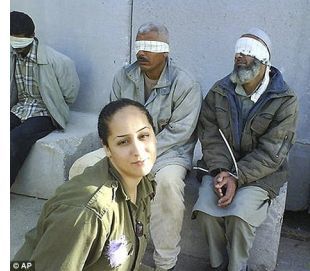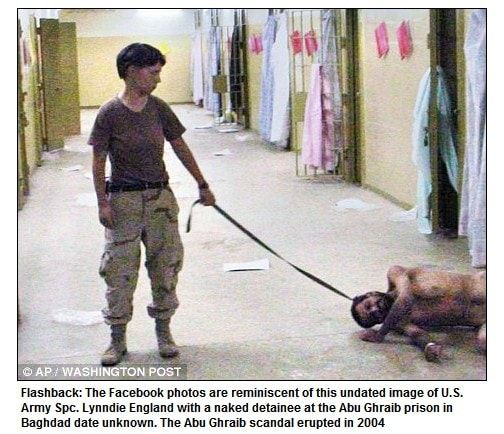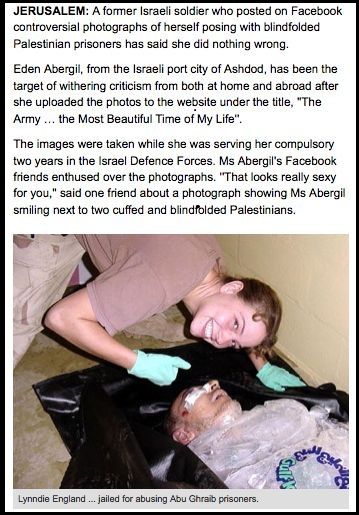 Israel is all too often held to different standards of behavior expected of other nation states, particularly western liberal democracies. Israel is, of course, far from perfect, yet individual blemishes are magnified under the intense glare of international media coverage to create a disproportionately negative image of the country as a whole.
Israel is all too often held to different standards of behavior expected of other nation states, particularly western liberal democracies. Israel is, of course, far from perfect, yet individual blemishes are magnified under the intense glare of international media coverage to create a disproportionately negative image of the country as a whole.
We do not intend to get into an extended debate on the many issues surrounding the very public exposure of former Israeli soldier Eden Abergil’s Facebook photos of her posing with blindfolded and handcuffed Palestinian prisoners.
Abergil’s Facebook photos are a legitimate story, but we have to question whether the stupidity and naivety of an individual IDF soldier warrants such intense international coverage. Even serious media outlets such as the Financial Times, which would usually avoid sensationalist material, have seen fit to publish the story.
Media Motivations
The quiet summer months are often referred to in media circles as the “silly season” where stories that would not normally warrant much attention become news in the absence of really solid material. The Mideast, however, is rarely void of interesting and relevant stories of importance to the region and the wider world.
For example, at the same time as the Facebook story was breaking, the Lebanese parliament voted to grant the country’s 400,000 Palestinian refugees the right to work in the same professions as other foreigners, lifting a decades-old ban that had relegated the refugees to the most menial jobs.
Or perhaps the announcement that Iran will begin building a third facility for enriching uranium in 2011?
Not to mention a horrific suicide bombing in at an Iraqi Army recruitment office in Baghdad or Israeli PM Netanyahu’s visit to Greece and the subsequent upgrading of military relations between the two countries.
One can speculate that much of the media’s coverage of Abergil’s Facebook photos may be motivated by an agenda that promotes stories that fit the framework of Israel as, at best, a flawed society, and, at worst, a gross abuser of human rights.
And the media likes nothing better than to portray the IDF as an immoral army. The BBC’s Paul Wood in a short piece of “analysis” states:
The IDF likes to think of itself as the most ethical army in the world and so condemned the photographs in strident terms. (They are also no fools when it comes to public relations).
For most young conscripts, and young Israelis who have completed their military service, I suspect the reaction will not be outrage but a simple shrug of the shoulders.
Wood even manages to include an insidious dig at the IDF’s public relations as if there is something sinister surrounding it. (Rarely mentioned by the BBC and other media outlets are the lack of press freedom in the Palestinian territories or the strident and well-coordinated campaign of demonization from anti-Israel activists.)
One can also consider where the Facebook photo story came from in the first place – the Israeli media and bloggers who exposed Abergil’s stupidity and sharply criticized her, not for soiling Israel’s and the IDF’s image, but for the ethical issues that the photos raised.
For the media to imply that Abergil is the product of a flawed society is to ignore the fact that Israel is deeply self-critical and has the capacity to address any ethical issues that arise from the Abergil affair.
The False Abu-Ghraib Comparison
The Associated Press writes:
The photographs were a reminder of snapshots taken in 2003 by American soldiers at Abu Ghraib prison in Iraq that showed Iraqi detainees naked, humiliated and terrified. In that case, some soldiers went to prison after the photos came to light.
As if to prove the point, the UK’s Daily Mail included the following photo and caption in its coverage of Abergil.

 The Sydney Morning Herald also published a photo from Abu Ghraib, which was subsequently removed after one alert reader sent in a complaint – but not before taking a screenshot of the offending web page, part of which can be seen here.
The Sydney Morning Herald also published a photo from Abu Ghraib, which was subsequently removed after one alert reader sent in a complaint – but not before taking a screenshot of the offending web page, part of which can be seen here.
This is further evidence that the media itself recognizes that the inclusion of such images from Abu Ghraib in the Abergil coverage is merely a tool for “sexing up” the story at the expense of credible journalistic values. That the SMH removed the photo so quickly appears to back this up.
It is left to Sky News Foreign Affairs Editor Tim Marshall to provide a voice of reason:
A thick Israeli girl publishes her photographs of herself making fun of Palestinians who have been arrested and fails to see what is wrong with so doing. What does this signify? That a thick Israeli girl has published her photographs and shown the world her cruelty. Anything else? Well, you could make a decent argument that the snaps are emblematic of a generation which has not been educated in empathy for ‘the other’. You could even go as far as to argue that they are part of a body of evidence of the routine humiliation of the Palestinian people. But to jumpfrom there to Abu Ghraib?
Abu Ghraib: Systematic, long-term torture and humiliation encouraged at a high level, involving officers, hundreds of photographs, a dark place utterly out of bounds to the media, mostly hidden from the human rights groups, which, when uncovered, sparks a fierce debate in the USA with a sig
nificant minority of people arguing that ‘it ain’t that bad’.Israel: One girl, Eden Abergil, on one occasion, gurning in front of detainees, which when uncovered, horrifies popular opinion in her country where she is now ridiculed as ‘one hell of an idiot’. …
… there are photos and video of just about every army in the world, including the British, where soldiers behave in a way they shouldn’t – and they are not always taken as being symbolic of a corrupt nation. …
to compare Abergil to Abu Ghraib, and to elevate it to a global story is just plain sloppy thinking, or worse, selective outrage.
The Eden Abergil Facebook photos is a case book study in how easy it is for the international media to take a negative story from the free and very critical Israeli press and to turn it into yet another stick with which to beat Israel.
Is criticism of Abergil warranted? Certainly. Does this mean that the IDF is any less moral than other western armies? Certainly not. Is this a story that warranted international attention and outrage?

